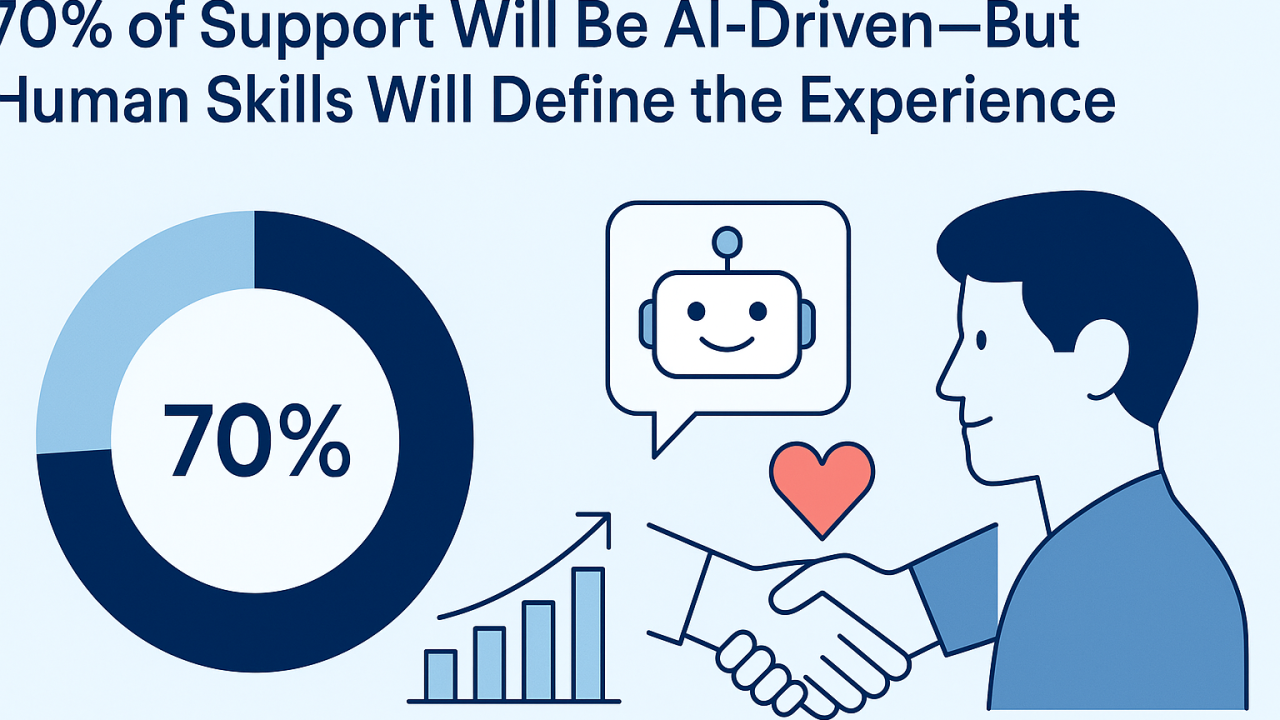70% of Support Will Be AI-Driven—But Human Skills Will Define the Experience

AI automation is transforming nearly every facet of business operations. From chatbots that resolve issues in real-time to machine learning models predicting customer churn, AI is reshaping the customer support landscape. But here’s the paradox: as AI handles more routine tasks, human skills like empathy, emotional intelligence, and active listening are becoming even more valuable.
According to the World Economic Forum’s Future of Jobs Report 2025, 70% of customer support tasks will be AI-driven by 2030. Yet, the report also highlights a rising demand for behavioral skills such as emotional intelligence, resilience, and persuasion. As AI takes over the transactional aspects of support, the human elements will increasingly differentiate the leaders from the laggards.
The Future of Support: A Blend of AI and Human Skills
While AI can efficiently handle routine inquiries and streamline workflows, customer experience still hinges on human interaction. When customers reach out for support, they are often dealing with frustration, confusion, or complex issues that require more than just a solution—they need understanding.
Support leaders who recognize this are finding new ways to integrate AI with human-centered practices. Rather than viewing AI as a threat to human roles, they’re leveraging it to free up their teams to focus on building genuine connections with customers. This is the future of support: AI amplifying human skills, not replacing them.
Building Human-Centered Support for 2030
As we move closer to 2030, forward-thinking SaaS companies are reimagining their support strategies by prioritizing human skills. Here’s how they’re doing it:
- Hiring for empathy and emotional intelligence: The most successful support teams are focusing on behavioral competencies during hiring, selecting candidates who can navigate complex human dynamics. Tools like situational judgment tests and behavioral interviews are becoming standard to assess how potential hires handle customer frustration, resolve conflicts, and build trust.
- Training for human connection: While technical training will always be important, many companies are expanding their programs to include empathy training, conflict resolution, and emotional intelligence. This prepares agents to better understand customer needs, de-escalate tense situations, and create memorable experiences that go beyond just solving problems.
- Redefining KPIs to value emotional intelligence: Rather than simply tracking metrics like resolution time or deflection rates, progressive organizations are measuring customer sentiment and relationship-building outcomes. This could include customer feedback on the empathy and understanding shown during an interaction, or agent ratings for handling difficult conversations.
Support Leaders: Architects of Human-Centered Cultures
As AI takes on more responsibility in support teams, the role of the support leader will evolve. No longer just an operational manager, support leaders will need to act as architects of culture, ensuring that emotional intelligence and human connection remain at the heart of the support experience.
These leaders will be instrumental in balancing AI-driven efficiency with the human skills that drive customer loyalty. They must prioritize empathy and trust-building across their teams, while also being the voice of advocacy for customers who expect authentic, human interactions in an increasingly automated world.
The Enduring Value of Human Connection
By 2030, it’s clear that AI will play a central role in customer support—but human connection will still be the cornerstone of lasting customer loyalty. AI will take over the "how" of customer support, automating routine tasks and scaling processes. But the "why"—the reasons customers reach out, the emotions they bring with them, and the trust they need to feel—will always belong to humans.
As AI continues to evolve, it will create more room for support agents to do what they do best: connect with customers, solve complex problems, and build long-term relationships. The companies that succeed in 2030 will be those that empower their teams to use AI as a tool, not a replacement, and place a premium on the human elements that machines can’t replicate.
Because, in the end, trust is built between people—not machines.

